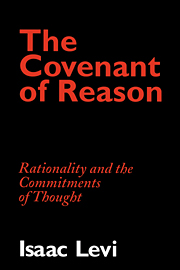Book contents
- Frontmatter
- Contents
- Introduction
- 1 Rationality and commitment
- 2 Rationality, prediction, and autonomous choice
- 3 The logic of full belief
- 4 Consequentialism and sequential choice
- 5 Prediction, deliberation, and correlated equilibrium
- 6 On indeterminate probabilities
- 7 Consensus as shared agreement and outcome of inquiry
- 8 Compromising Bayesianism: A plea for indeterminacy
- 9 Pareto unanimity and consensus
- 10 The paradoxes of Allais and Ellsberg
- 11 Conflict and inquiry
- 12 The ethics of controversy
- Name Index
- Subject Index
Introduction
Published online by Cambridge University Press: 05 June 2012
- Frontmatter
- Contents
- Introduction
- 1 Rationality and commitment
- 2 Rationality, prediction, and autonomous choice
- 3 The logic of full belief
- 4 Consequentialism and sequential choice
- 5 Prediction, deliberation, and correlated equilibrium
- 6 On indeterminate probabilities
- 7 Consensus as shared agreement and outcome of inquiry
- 8 Compromising Bayesianism: A plea for indeterminacy
- 9 Pareto unanimity and consensus
- 10 The paradoxes of Allais and Ellsberg
- 11 Conflict and inquiry
- 12 The ethics of controversy
- Name Index
- Subject Index
Summary
Rationality, according to some, is an excess of reasonableness. We should be rational enough to confront the problems of life; but there is no need to go whole hog. Indeed, doing so is something of a vice.
Obsessive behavior that insists on computing to the 100th decimal place when the demands of the situation call for determining no more than 2, may, indeed, be an obstacle to effective agency. We need not explicitly or consciously seek to identify the implications of our beliefs and values any further than is required in order to address the problems we currently anticipate facing. But defenders of rationality do not say otherwise when they claim that rational agents ought to recognize the implications of their beliefs and values. Obviously, this obligation applies “when and to the extent that the need arises.” However, there is no upper bound on how complex the problems are that we may need to face. As a consequence, it is always desirable to improve our capacities to confront ever more sophisticated tasks. Advocates of reasonableness seem to deny or overlook this point.
Such denial would make sense if we led lives so simple that we could get by without taxing our ratiocinative capacities. There would then be no need to improve our capacities to reason well, for the capacities of human agents would never be stretched to the limit by the complexities of life and nature.
- Type
- Chapter
- Information
- The Covenant of ReasonRationality and the Commitments of Thought, pp. vii - xivPublisher: Cambridge University PressPrint publication year: 1997



